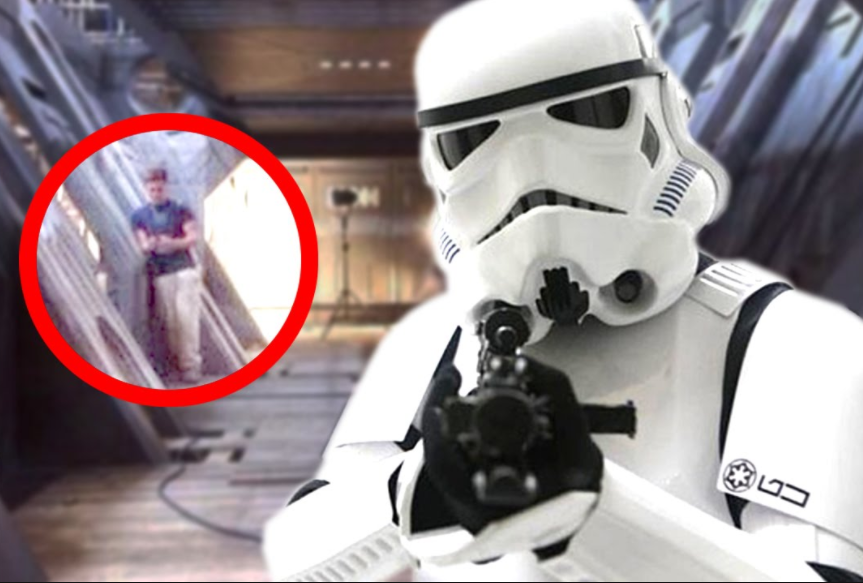Have you ever seen the movie North by Northwest? There's a moment, in the background,
你看過電影《西北偏北》嗎?背景中有這樣的一瞬間,
where a little boy plugs his ears right before a gun goes off.
一名小男孩在槍響前塞住耳朵。
And in Pretty Woman, Julia Roberts is eating a croissant in one shot and a pancake in the next.
在《風(fēng)月俏佳人》(Pretty Woman)中,朱莉婭·羅伯茨(Julia Roberts)第一次吃的是羊角面包,第二次吃的是煎餅。
Little mistakes like these are in almost every movie you've ever seen,
你看過的所有電影中幾乎都會(huì)出現(xiàn)這樣的小錯(cuò)誤,
but you've probably never noticed them—even though they're right there on the screen in front of you.
但你可能從未注意到它們——即使它們就出現(xiàn)在你面前的屏幕上。
It's weird. You'd think noticing things that are out of place would be an evolutionary advantage.
這很奇怪。你可能會(huì)認(rèn)為,注意到不該出現(xiàn)的事物是一種進(jìn)化優(yōu)勢(shì)。
But it turns out that our brains aren't actually that good at perceiving things.
但事實(shí)證明,實(shí)際上我們的大腦并不擅長(zhǎng)感知事物。
It's more than your eyes recording whatever's going on in front of them—
不僅僅是眼睛在記錄眼前發(fā)生的事情——
your brain has to interpret the image they produce.
大腦必須對(duì)生成的圖像進(jìn)行解釋。
And when it prioritizes what it thinks is important, sometimes you don't notice what's right in front of your face.
當(dāng)大腦優(yōu)先考慮它認(rèn)為重要的事情時(shí),有時(shí)你會(huì)忽略眼前發(fā)生的事情。
You can miss more than just small mistakes: In a famous experiment conducted in 1999,
你錯(cuò)過的不僅僅是小錯(cuò)誤:1999年的一個(gè)著名實(shí)驗(yàn)中,
subjects watched a short video of two groups of people tossing around a basketball.
受試者觀看了兩組人投擲籃球的短片。
Some wore white clothes, and the others wore black clothes.
有的穿著白色的衣服,其他人穿著黑色的衣服。
The subjects were asked to count the number of times the players wearing a particular color passed the ball.
受試者被要求計(jì)算穿特定顏色衣服的球員傳球的次數(shù)。
But while they were busy counting, a person wearing a gorilla suit walked right through
但當(dāng)他們正忙著數(shù)的時(shí)候,一個(gè)穿著大猩猩衣服的人徑直走過。
the shot, thumped her chest, and walked off! About half of the subjects didn't notice the gorilla walk through at all.
子彈擊中了她的胸部,然后走開了!大約一半的受試者根本沒有注意到大猩猩行走。
If you've taken the test and didn't notice it either, don't feel bad—your brain was busy at the time.
如果你參加了測(cè)試,也沒注意到的話,不必難過,那時(shí)你的大腦很忙。
When you don't notice an unexpected change because you're focusing on something else,
你沒有注意到一個(gè)意料之外的變化,因?yàn)槟汴P(guān)注在別的事情上,
that's called inattentional blindness. And it can tell you a lot about how our brains process the world around us.
我們稱之為“無(wú)意視盲”。它能告訴你大腦是如何處理我們周圍的世界。
When you're focusing on something, your brain will automatically filter out information it thinks is irrelevant.
當(dāng)你專注于某事時(shí),大腦會(huì)自動(dòng)過濾掉它認(rèn)為不相關(guān)的信息。
So when you're concentrating on counting people passing a basketball, your brain ignores everything else—
所以當(dāng)你集中精力計(jì)算人們傳球的次數(shù)時(shí),大腦會(huì)忽略其他一切事物——
even a gorilla walking across the screen.
甚至一只大猩猩從屏幕上走過。
Something similar happens when you're watching a movie where there's a mistake:
當(dāng)你在看一部有錯(cuò)誤的電影時(shí)會(huì)發(fā)生類似的事情:
your brain focuses your attention on the most important things,
你腦把注意力集中在最重要的事情上,
and a little boy plugging his ears in the back of the room isn't as important as the main character in mortal danger right in front of you.
一個(gè)小男孩在房間后面堵住耳朵,并不像你眼前置身危險(xiǎn)的主角一樣重要。

Your brain kind of has to pick something to focus on,
你的大腦需要選擇一些東西來(lái)集中注意力,
because even though our eyes have a pretty wide field of view, they can only focus on a very small area at a time.
因?yàn)榧词刮覀兊囊曇跋喈?dāng)廣闊,他們一次只能集中在一個(gè)非常小的區(qū)域。
Eye tracking experiments have shown that we tend to focus our gaze on other people's hands and faces—
眼球追蹤實(shí)驗(yàn)表明,我們傾向于把目光集中在別人的手和臉上——
two huge sources of information when we communicate with each other.
我們相互交流時(shí)的兩大信息來(lái)源。
And yet, in Pretty Woman, Julia Roberts was holding a croissant in her hand in one shot, which turned into a pancake in the next.
然而,在《風(fēng)月俏佳人》中,朱莉婭·羅伯茨手里拿著的羊角面包在下個(gè)場(chǎng)景變成了煎餅。
If your brain considers hands and faces important, you'd think you'd notice something changing in her hand.
如果你的大腦認(rèn)為手和臉重要,你認(rèn)為自己會(huì)注意到她手上的變化。
But you don't, because your brain also tries to correct for continuity errors.
但你沒有,因?yàn)槟愕拇竽X也試圖糾正連續(xù)性錯(cuò)誤。
In 2014, researchers at UC Berkeley looked into this by asking subjects to match the orientation of a white bar
2014年,加州大學(xué)伯克利分校的研究人員通過讓受試者將白條的方向與屏幕上多次閃現(xiàn)的
to a black bar that flashed on the screen, over and over again.
黑條相匹配來(lái)研究這一問題。
But the subjects weren't very good at matching the angles of the bars.
但受試者并不擅長(zhǎng)匹配白條和黑條的角度。
They tended to choose an angle that was an average of the three most recent bars they'd seen.
他們傾向于選擇一個(gè)角度,這個(gè)角度是他們最近三次所見黑白條的平均值。
The team suggested that this mistake is your brain trying to make sure your experience of reality has the same kind of continuity that you'd expect from a movie.
研究團(tuán)隊(duì)認(rèn)為,錯(cuò)誤的產(chǎn)生是因?yàn)榇竽X試圖確保人的現(xiàn)實(shí)體驗(yàn)和從電影中的期待保持一致的連續(xù)性。
Sometimes, that involves blending your experience over about 15 seconds to be as smooth as possible,
有時(shí)候,這需要在15秒內(nèi)將你的經(jīng)歷盡可能流暢地銜接起來(lái),
in what's known as a continuity field. So if the input from your eyes shows Julia Roberts' breakfast changing between shots,
在所謂的連續(xù)場(chǎng)景中,如果你眼睛的輸入顯示是鏡頭間朱莉婭·羅伯茨的早餐變化,
your brain will pretend it's just a glitch in the Matrix and ignore it to keep you from being confused.
你的大腦會(huì)假裝這只是矩陣中的一個(gè)小故障,然后忽略它,以免你感到困惑。
Focusing like this can be really helpful when, say,
像這樣的聚焦非常有用,
you're trying to have a conversation with someone at a crowded, noisy party,
你試圖在一個(gè)擁擠嘈雜的聚會(huì)上和某人交談,
or follow the story and characters in a convoluted spy thriller.
或者是講述一部錯(cuò)綜復(fù)雜的間諜驚悚片里的故事和人物。
But it also means that sometimes you'll miss things that are right in front of you.
但這也意味著有時(shí)候你會(huì)錯(cuò)過眼前的東西。
It's a little unsettling that you can miss something as significant as a gorilla walking across your field of vision,
有點(diǎn)令人不安的是,你可能會(huì)錯(cuò)過一些重要的東西,比如大猩猩進(jìn)入你的視野。
and it's important to know that our brains work that way,
知道我們的大腦是這樣工作的很重要,
especially when it comes to things like eyewitness testimony in court cases.
特別是當(dāng)涉及到法庭上的目擊者證詞時(shí)。
But it's normal not to notice little mistakes in movies, or even big, unexpected things.
但在電影中注意不到小錯(cuò)誤,甚至是大的、意想不到的事情,都是很正常的。
Your brain is just trying to make you see what it thinks you're supposed to see.
你的大腦只是試圖讓你看到它認(rèn)為你應(yīng)該看到的東西。
Thanks for focusing your attention on this episode of SciShow Psych,
感謝收看本期的心理科學(xué)秀,
and thanks to our patrons on Patreon for making this show possible.
感謝Patreon為我們的節(jié)目提供贊助。
For more on weird human quirks, you can go to youtube.com/scishowpsych and subscribe.
想了解更多關(guān)于人類不可思議的行為,請(qǐng)?jiān)L問并訂閱youtube.com/scishowpsych。


